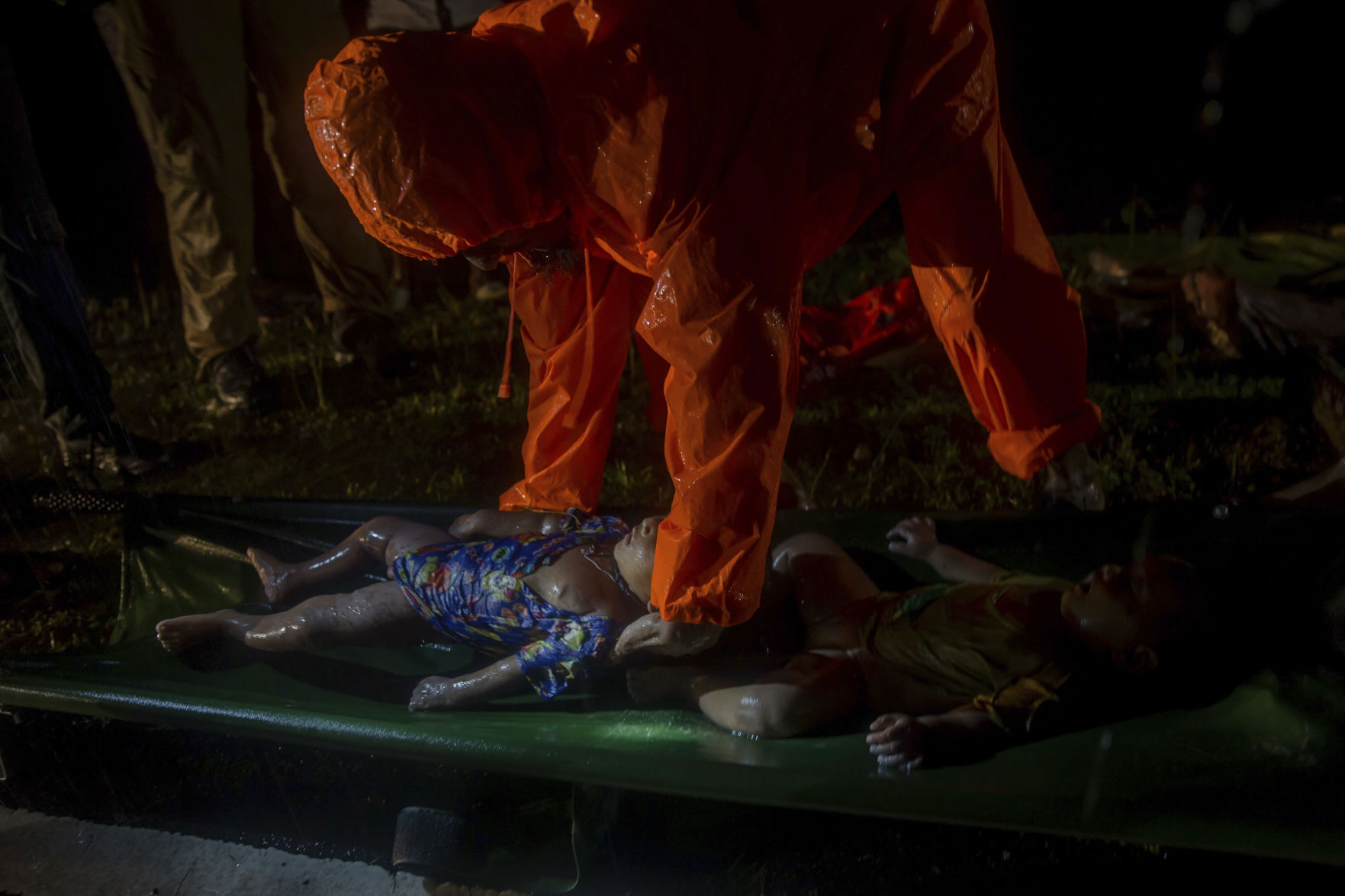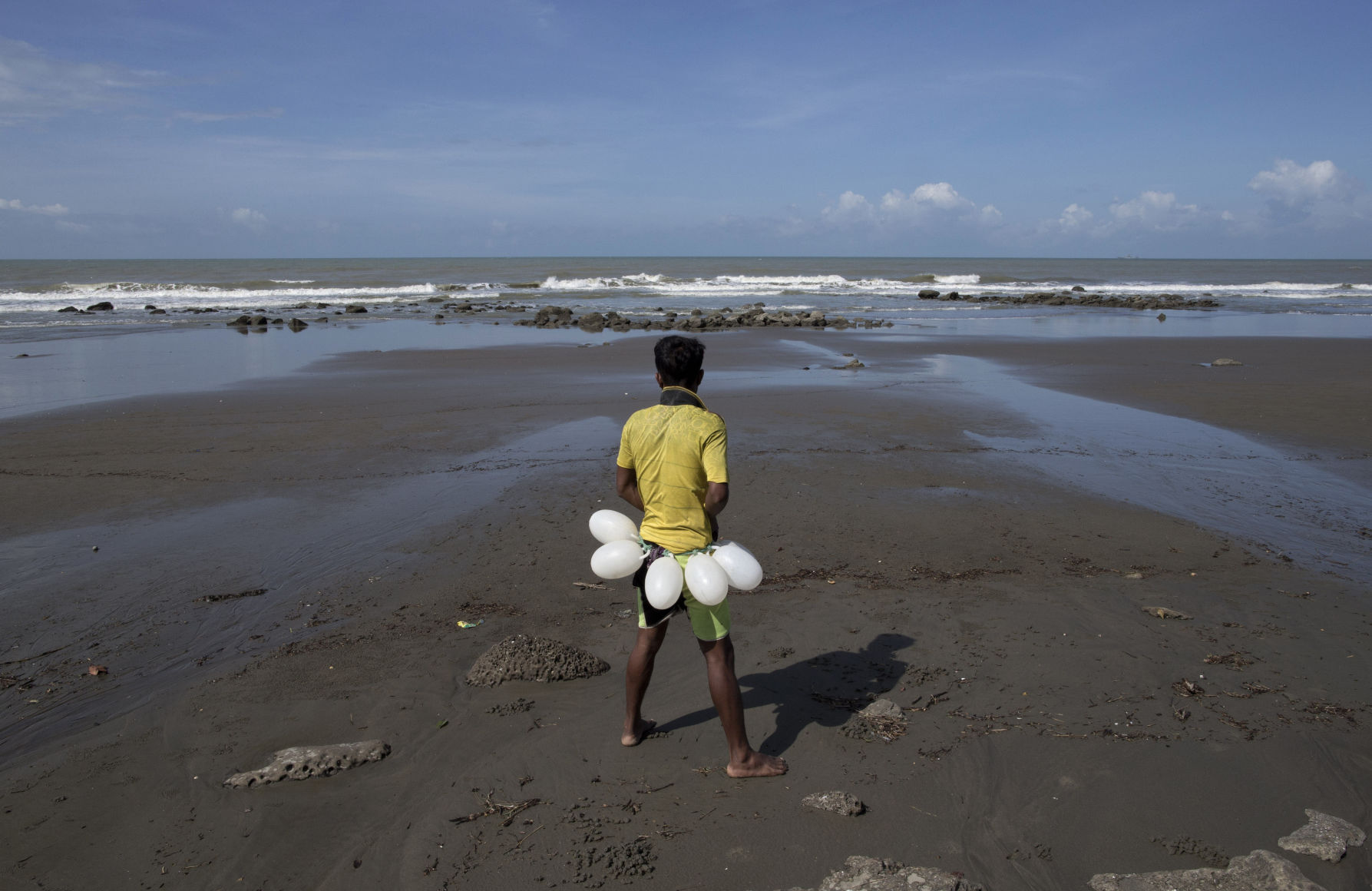INANI BEACH, Bangladesh (AP) — Across the churning black water of the ocean, Alam Jafar could see his frantic seven-year-old son gasping for breath. The boy was crying out louder than he ever had in his life — he did
INANI BEACH, Bangladesh (AP) — Across the churning black water of the ocean, Alam Jafar could see his frantic seven-year-old son gasping for breath. The boy was crying out louder than he ever had in his life — he did not know how to swim.
“Papa! Papa! Help Me!”
Just moments before, Jafar and his family had huddled together in a small fishing boat filled with refugees from Myanmar bound for Bangladesh. They were part of the largest human exodus in Asia since the Vietnam War — more than 500,000 Rohingya Muslims fleeing Buddhist mobs and soldiers.
What happened next, just 1,000 feet from shore, would take the lives of at least 50 people, most of them children, in the deadliest tragedy of its kind since the crisis exploded in late August. Through interviews with more than a dozen survivors, The Associated Press has reconstructed their ill-fated journey late last month.
A few months ago, in response to Rohingya insurgent attacks in Myanmar, mobs backed by security forces began setting entire Rohingya villages ablaze. In September, Jafar, a 25-year-old farmer, woke to gunfire and screams. Outside, flames were rising in the distance. Whole families had begun fleeing.
“How can we just leave everything behind?” his wife Tayiba Khatun asked, in tears.
“We have no choice,” Jafar whispered. “Our belongings are not going to save our lives.”
They and their three children, including newborn twins, joined an endless stream of families leaving the village. They hiked for two days until they finally reached the coast. Thousands of refugees were already camped on the beach.
When a dozen fishing boats from Bangladesh suddenly appeared, Jafar and his family jumped to their feet.
A boatman counted off about 80 people, including as many as 50 children, and let them on board. The boat pulled away to cross the Naf River to Bangladesh.
One hour passed. Then two.
Over the next few hours, the weather grew steadily worse. They had strayed far off course, deep into the ocean.
“We’re lost,” the boatman said, staring ahead into the night.
The refugees began praying. Jafar could hear his wife weeping.
After a few hours, someone spotted the twinkling lights of a large ship in the distance. They waved scarves above their heads and shouted.
Thirty minutes later, the lights had faded away.
At dawn, a new feeling of dread set in. All they could see was water.
Jafar’s wife turned angrily to her husband, fighting back tears again.
“How could you do this to us? Why?” she said.
Soon, the boatmen announced that the boat was dangerously overloaded. They hurled the small bags and bottles the refugees held overboard.
In whispers, Jafar and his wife began to discuss the unthinkable.
“Please forgive me,” Khatun said, “if I ever did anything wrong to you.”
As the boat rocked endlessly back and forth, they drifted in and out of sleep. And then they were startled to hear one of the boatmen yelling.
“It’s there! It’s there!”
Jafar thought he was dreaming. But when he lifted his cramped body up, he saw the top of a green hill peeking out of white clouds on a coast.
“Oh, blessed Allah, he knows where we are,” Khatun said.
As the boat motored toward the shore, though, the wind began to pick up again. The sky darkened. Torrential sheets of rain began to fall.
And then, somewhere around 3:30 p.m., the engine died.
Without power, the boat was at the mercy of the waves. A giant wave suddenly thrust the boat upside down. It threw Jafar into the surging ocean with the twins, wrapped around his chest in a longyi.
He could barely see, but he spotted his wife, and his son. He heard Mohamed crying out.
“Papa! Papa! Help Me!”
“Papaaaaaa!”
Then the second wave crashed down. He lost sight of them.
For half an hour, Jafar struggled to swim on his back in the current. But the waves and the weight of the twins kept pushing him down. He didn’t know if they were dead.
He was exhausted. When he realized he would drown if he held on to them any longer, he untied the longyi, and let go.
By the time he crawled onto the beach and collapsed, it was twilight.
“Where am I?” Jafar asked a stranger weakly.
“Brother,” the man said. “You are in Bangladesh.”
On the beach, Jafar searched desperately for Khatun and Mohamed and the twins.
When he found their bodies, laid out on the sand by rescue crews, he broke down and wept.
Of the 80 refugees believed to have been on the boat on Sept. 28, only 24 are known to have survived.
Police collected 23 corpses from the shore. The rest — mostly children — are missing and presumed to have drowned. They are among at least 184 Royingya on 28 capsized boats who have died trying to make the crossing to Bangladesh since August.
Jafar can’t stop thinking about what happened.
“Why did I bring my children here and let them die in the water?” he asks. “Wouldn’t it have been nice if I, too, had died?”
The mass grave where his wife and children are buried is not far away.
There are no names. Just a trio of palm fronds stuck in the dirt.
———
Associated Press journalists Rishabh R. Jain and Yasin Dar contributed to this story.




